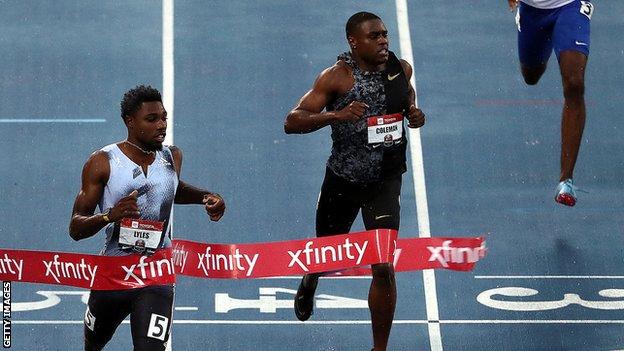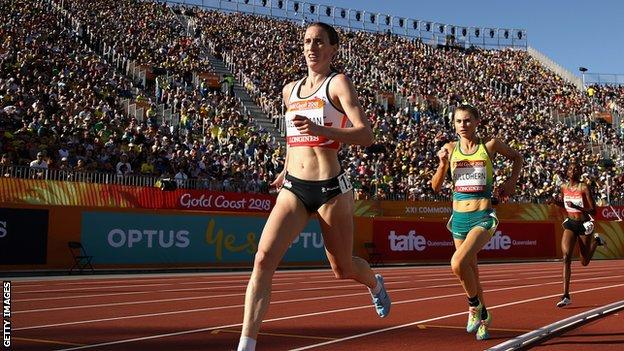
Steve Cram says his reaction to sprinter Christian Coleman being charged with missing three drugs tests is "less of surprise, more of despair".
He will be banned for one year if found guilty at an arbitration hearing on 4 September, ruling him out of the World Championships and 2020 Olympic Games.
American Coleman ran the fastest 100m time in the world this year in June.
"As a professional athlete, it's your responsibility to be available for drug testing," said BBC commentator Cram.
"It's nowhere near as difficult as it used to be so there really aren't many excuses, although there will always be situations where things go wrong.
"That's where the despair comes in. You think: really?"
The US Anti-Doping Agency (Usada) says a decision will be made the day after 23-year-old Coleman's hearing. The World Championships, held in Doha, start on 27 September.
Coleman, seen by some as an heir apparent to Usain Bolt, has been charged with failing to "properly file his whereabouts information".
Under the 'whereabouts' system, athletes must let officials know where they will be for one hour every day as well as details of overnight accommodation and training.
Failure to do so three times in a 12-month period could lead to a rule violation under the World Anti-Doping code.
Coleman has said that "what has been widely reported concerning filing violations is simply not true", adding that he is "confident" the Usada hearing will "clear the matter".
British former 400m Olympic champion Christine Ohuruogu received a year's ban in 2006 for missing three tests.
With a personal best of 9.79 seconds, Coleman is the seventh fastest man in history. His 2019 world-leading time of 9.81 came in the Diamond League meeting in California.
He finished second at the 2017 World Championships in London behind fellow American Justin Gatlin, who was twice banned from doping.
British sprinter Ojie Edoburun, who qualified for Doha on Saturday by winning the British Championships, said he had little sympathy for Coleman.
"Missing three tests in a year is easily avoidable," he said. "At the end of the day, the athletes are liable. I know that - so he should, too, if he is the fastest man in the world."

Noah Lyles (left) beat Coleman is the 200m of the US Championships in July
Coleman won the US National Championships last month in 9.99, but, according to Cram, he is not yet at the level of Jamaican Bolt, the 100m and 200m world record holder who retired in 2017.
"There is a lot more noise around fellow American Noah Lyles, who like Bolt regards the 200m as his best event," said Cram.
"Coleman is a different type of athlete, excellent indoors and drops into the mould of a very traditional American sprinter such as Maurice Green, Gatlin or Tyson Gay.
"Lyles is more open with the media, wears colourful socks and is more smiley, whereas Coleman is quite quiet and not a showman, which is fine."
Lyles is not running the 100m in Doha and, if Coleman is banned, Gatlin will be favoured to defend his title.
"Whatever Gatlin's rehabilitation efforts, he has a proven history of taking drugs and that cannot be good for the sport," Cram, the 1983 1500m champion, added.
"I can't remember the last World Championships where there wasn't a drugs story, but sadly, that is part and parcel of the world we live in."
Cram, who is also a coach to British middle distance runner Laura Weightman, said any missed tests require a "degree of carelessness" and warned that danger comes when athletes delegate responsibility to their entourage.
"What always surprises is how much athletes allow their entourage - be that a coach or agent - to take care of business for them," he added. "Their travel, hotel, where they are training - it's pretty much all handled.
"British athletes do the same, they want to get on with training, but that's always a dangerous position to be in for me.
"I coach Laura Weightman and she has had it drummed into her from day one that she takes that responsibility, using the Adams (Anti-Doping Administration and Management) system and she is always updating it.
"She's always asking me: 'Where am I going to be? Which hotel am I going to be staying in?' So she knows ahead of time for whereabouts testing to make sure she's not in danger of missing a test.
"Everybody is different and I don't know Coleman well enough to know if he takes that responsibly himself or allows others to do it, but I'd suspect that is part of what is going on here.
"There are not many things you have to do as a top-class athletes; get yourself fit, compete well but, in terms of responsibility, [making yourself available for testing] is number one."

Steve Cram says Laura Weightman takes responsibility for all of her whereabouts for testing purposes
Despite more negative stories about athletics, Cram said he is "pleased" by Coleman being charged as it shows the system is working.
"Not to defend athletics and those who have been cheating but I still believe we have led the world in terms of how rigorous we are around testing, and it's an ongoing battle," he said.
"There's nothing new here, in that we are trying to stop people cheating. Missed tests is a different scenario from taking banned substances, but it's still part of the same process.
"All we can do is trust what we are watching until it's proven otherwise. Everybody has to make up their own mind.
"I can't tell people what to think or how indignant they should be. Does it stop people wanting to sprint? No. Does it stop people wanting to be the fastest man or woman in the world? No. Are people going to still cheat to try and achieves this? Yes."